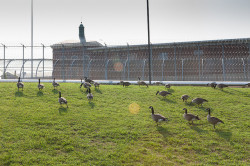Words cannot adequately illustrate the positive energy coming from Jessup last night…but I will try to describe yesterday’s event.
At 5:20PM I left the University of Baltimore (UB) to drive to my weekly Criminal Justice class at Jessup Correctional Institution (JCI). For the past few weeks 11 of my UB students attended joint classes with 24 incarcerated men at JCI. On a normal day it takes 30 minutes to drive to JCI….but last night’s monsoon resulted in a two hour commute for some of us. As I drove to JCI, stuck in endless traffic, I worried that I would never arrive in time for class. I questioned my decision not to cancel class, worried about students not showing up, worried that students would complain, and was convinced that our late arrival would result in not be permitted to enter the facility. I tried to calm myself by remembering that tonight’s class was especially important and that we must make every effort to get there.
To my surprise, when I arrived I found all of my students waiting on me! I was moved that everyone made the extra effort to get to JCI, and that not a single one complained! Many students even left their homes or jobs early so they would arrive on time. I heard several students say they did not want to miss this class since it was our last one. After a few more obstacles getting through security (never a dull moment!) we eventually made our way through the prison grounds to the education building where our class is held. Of course Vince, one of our classmates, was there to greet us and rushed us toward the classroom.
Like every week, our time together is short and often shortened further by various delays. So as we walked Vince quickly gave me the run down on how the “certificate ceremony” would go tonight. As we entered the classroom, all the JCI guys had already gathered in a circle formation. The UB students filled in the empty chairs in between the JCI students. We immediately proceeded with the ceremony. Vince – graciously leading the way – said a few words to get started. He creatively put together a power point slideshow that illustrated each student’s name as they were called up to receive the certificate. We started with the UB students first – the “Future Criminal Justice Reformers” as Vince labeled them. Robby was the first to be called up. Everyone cheered as Robby received his certificate and proceeded to jog around the circle giving high-fives to each and every student in the circle. This continued for the next few minutes as all UB students were recognized for their contribution to the class. Next, the JCI students – “the Experts” – were each acknowledged for their equal contribution to the class.
After all students were recognized Shakkir presented Vince with a special award for his endless dedication and commitment to making the JCI Scholar Program so successful. Thoughtfully, the students also awarded me a certificate of appreciation. And lastly, a special certificate was awarded to me honoring my child in utero – an extremely touching moment that simply shows the endless thoughtfulness and compassion of this group. The energy in the room during the ceremony was phenomenal. For 30 minutes there was laughter, cheering, smiles, high-fives, and even a few football (touchdown) style dances. It was as if we all won the Nobel Peace Prize.
To end the ceremony each student shared one or two words to express their feelings about the experience together. Bittersweet…humbling…open minded…optimistic…inspired…grateful…empowered. Who would have thought that in just a few weeks these two groups would blend so well, would work collaboratively, would pull together a final project with limited resources, would become classmates, and in the end would share similar emotions about an experience that allowed them to simply come together and share the learning process. This transformative learning experience is credited to the National Inside Out Prison Exchange Program – for without that program last night never would have transpired.
(stay tuned for details on the students final projects…)
